PARTICIPATION OF THE ICWC DELEGATION AT THE 5th WORLD WATER FORUM
The 5th World Water Forum was organized according to resolution of WWC by the Turkish Government in Istanbul, 16-22 March, 2009.
According to resolution of the Turkish Government, the Forum preparation and realization were committed to the Ministry of Environment and Forestry of Turkey jointly with the city administration of Istanbul. The huge preparatory work through both the regional and thematic events, and political process has preceded the Forum.
The thematic process was organized on 6 main themes:
- Global Changes and Risk Management.
- Advancing Human Development and the MDGs
- Managing and Protecting Water Resources and Their Supply Systems to Meet Human and Environmental Needs
- Governance and Management
- Finance
- Education, Knowledge and Capacity Development.
Representatives of Central Asia were involved in the thematic process through SIC ICWC and GWP of Central Asia and Caucasus on 1st, 2nd, 3rd and 4th themes.
The regional sessions were organized for the continents: America, Europe, Africa, Asia and Pacific Ocean. Central Asia was included into a Special regional group “In & Around Turkey”. In the framework of regional process the SIC ICWC jointly with Executive Committee of IFAS and GWP under the financial support of the Turkish Government organized the workshop “Climate Change, Water Resources Management, Governance and Capacity Building Issues in Central Asia and Caucasus”, which was held in Bishkek in May 2008 and was attended by all the countries in the region.
Countries were involved in the political process through the virtual discussion of some documents and direct participation in the work of the Political Committee which was implemented through the Ministry of Foreign Affairs. The direct discussion on the Ministerial Declaration, the Istanbul Declaration and Parliamentarians Declaration was held with participation of Embassies of countries in Rome, Ankara and Paris accordingly. The Ministerial Declaration and Statement having been formulated as a whole and presented at the Forum did not meet by the way with all people approval to which the organizers of process aspired because texts were not clear enough and have no obligations to anything.
The Forum had gathered a large number of participants. 33,058 participants took part in the 5th World Water Forum, including Water Fair participants from 192 countries: 90 ministers, 315 parliamentarians and local authorities, 11 prince, president and prime ministers have met for the Heads of State Summit, 135 children from 21 countries gathered for the 3rd World Water Children Forum, more than 200 young people attended to the Youth Forum. The Forum has been followed by 1,027 accredited journalists.
The main Forum event was accompanied by the Youth Forum and the Children's Forum which involved a large number of young participants from various countries. The next persons attended the Forum opening: Abdullah Gul, President of the Republic of Turkey; Suleyman Dimirel, former President of the Republic of Turkey; Celal Talabani, President of Iraq; Emomali Rakhmon, President of Tajikistan, Prince of Orange Willem-Alexander of the Netherlands; Albert II, Prince of Monaco; Naruhito, Crown Prince of Japan; Sha Zukang, UN Deputy Secretary-General; Abbas El Fassi, Prime Minister of Morocco; Chudinov I., Prime-Minister of the Republic of Kyrgyzstan.
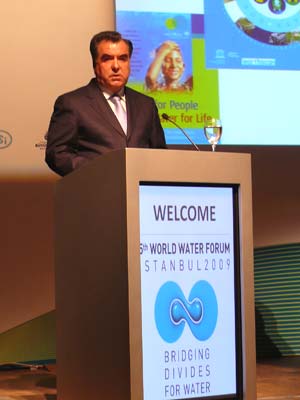
As a whole, 231 various events were organized at the Forum, including 200 related to Central Asia.
Main Challenges highlighted at the Forum
As a whole, 321 registered natural disasters occurred in 2008 because of climate change impact that resulted in death of 235816 people, 211 million suffered people and 181 billion dollars lost by humankind.
Despite of undertaken measures on improvement of water supply, its condition is not improved, and the struggle against hunger does not give appreciable results. As compared with 1990, the total number of undernourished people increased up to 854 million in 2003 and 963 million in 2008. According to the UN assessment, 1 billion people currently lack access to safe drinking water, while about 2.5 billion lack access to adequate sanitation. Despite of implementation of the International Year of Sanitation in 2008, achievement of MDGs is far from good indices as compared with those in the beginning of year. Thus, there is no meaningful improvement of water supply and sanitation for the period from the 1st WWF till today despite of permanent implementation of various measures on attracting attention of governments and the world community. The certain concern in this direction was sound on all events at the Forum and was expressed by the main issue, which defines efficiency and the progress in decisions, which is lack of financial resources. The rough estimation of needed investments to solve the water supply and sanitation problem in less developed countries is estimated about 100 billion dollars per year.
It should be noted that another challenges were not evaluated as a whole at the Forum. These are as follows: deteriorating situation of equitable and stable water delivery for irrigation under impact of increasing activity in the hydropower engineering sphere and also in relating with increase of water demands because of temperature rise; struggle against increasing hydro egoism in the runoff formation zones, which try to dictate the rivers regime and water allocation to the downstream countries; need to strengthen the international control to the extent of the Security Council on the human water rights for drinking, domestic purposes and food production; need to strengthen the transboundary cooperation and to reach the hydrosolidarity on the basis of equity, openness, trust, the equal water use rights as well as the equal rights for benefits from water use.
Unfortunately, in the Ministerial Declaration and in the Ministerial Statement these issues weren't highlighted that was noted during the Closing Session by many of the participants including ministers of Uruguay, Bulgaria, Bolivia, Ecuador, Syria, Iraq, Hungary, the President of the League of Arab States, the Vice-Chairman of Asia Water Forum, Vice-Chairman of UNECE. The very remarkable case is the statement (which was disseminated by the UN Secretariat) by His Highness Miquel d'Eskoto Brokmann, President of the UN General Assembly, who opposed the monetary aspirations in the main documents of WWF5. In his opinion the WWF puts obstacle in the way of partnership with advocates of real water democratization, and he appealed countries, which didn't approve Declaration, to join his opinion.
Conclusions (below) made in some thematic reports have deserved special attention.
Concerning Theme 1 the need for fundamental change of attitudes to forecasts, to climatic and hydrological data for water management and agriculture, to easy access to databases, to results of important analysis and especially of potential risks of disasters is noted. Careful attention should be paid to preventive measures which in such cases as the Katrine typhoon and Australian drought require less financial resources (10 times less), if information is received in time, than removal of consequences.
Concerning the Theme 2 it is noted that external factors such as development of agrifuel products, predominance of the hydropower interest in the reservoirs maintenance, climate change and the commodity price decrease sharply potentialities to supply agriculture with water. The additional measures are required to improve water supply for the global food production.
Requirements to increase the food production can not be satisfied under existing structure and tendencies of agriculture. It is needed to turn fundamentally to the optimal system which combines small- and large- scale water systems with high degree of effective production and water saving and also improvement of dry farming.
Along with the IWRM implementation, the multipurpose use and functions of water have to be used for strengthening a governance and involvement of various stakeholders to decision making and allocation of costs and benefits.
Concerning the Theme 3 it is noted that the increasing competition for the limited water resources indicates the effectiveness of IWRM implementation based on the wide involvement of stakeholders, including the transboundary context and situations with floods and droughts, and necessity to break the traditional sector approaches. With this point of view the World must be concentrated on hydrosolidarity as the basis for improvement of the transboundary basins cooperation. It concerns not only the mutual relations between managers of water resources and waterusers but also involvement of local administrations and national governments. Here expediently to emphasize the priority of strengthening the ecological requirements especially for deltas and coastal zones. The intensive pollution of the environment is continuing in the developing countries: 90-95% of all municipal waste waters and 75% of industrial wastes come directly into water sources.
Concerning the theme 5 a number of water reforms have been proposed both relating to demands and water delivery. This requires increase of water service for water users as a priority. Financial aspects can be reached by minimization of costs and by better ensuring the ROI (return of investment) on the basis of projects prioritizing.
The water sector financing is not to be oriented to full recovery by water users themselves. It is to be based on the well-thought combination of 3 basic factors: water tariffs, taxes and grants. The strategic financial planning is to be a basis for selection of appropriate tariffs, taxes, intersectoral subsidies and special financial injections.
The 6th theme is devoted to Education, Knowledge and Capacity Development. It is noted that attention of governments to financing this activity as the base of further progress and understanding the situation dynamics must be strengthened.
The most essential outputs of the Forum are:
- Publication of 3-rd edition of Global Water Assessment that is evidence of increased water crisis;
- The increased attention to problems on transboundary water resources, hydrosolidarity and to ensuring the water rights during discussions in contrast to the same contained in the Declaration;
- Presentation of "Diploma of World Leaders on the International Water Policy" to Uzbekistan for the active participation in and support of "The 1997 UN International Watercourses Convention" among other 16 countries.
The Central Asia countries were presented by numerous delegations especially Kyrgyzstan, Tajikistan and Uzbekistan. Delegations were headed by: A. Kurishbaev, Minister of Agriculture of the Republic of Kazakhstan; I. Chudinov, Prime-Minister of the Republic of Kyrgyzstan; K. Atalyev, Vice-minister of Water Resources of the Republic of Turkmenistan; E. Rakhmon, President of the Republic of Tajikistan; and Sh. Khamraev, Vice-minister of Water Resources and Agriculture of the Republic of Uzbekistan.
The heads of delegations actively participated at the Asia-Pacific Water Forum, ministerial dialogues, at the Forum closing meeting and other panels.
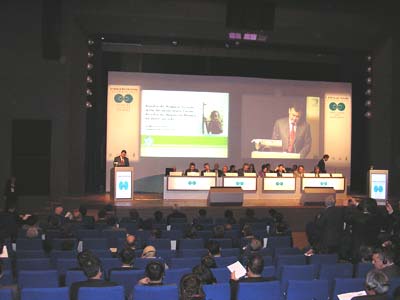
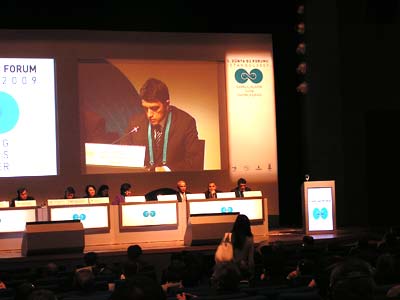
Delegations actively participated at the sub-regional event "Climate Change, Water Resources Management, Governance and Capacity Building in Central Asia and Caucasus" which was organized by ICWC jointly with GWP, where more than 120 people took part and the brilliant discussions about the solidarity achievement in the water resources management in the region were held, as well as the poster presentation about achievements in IWRM and automation system in the Fergana Valley.
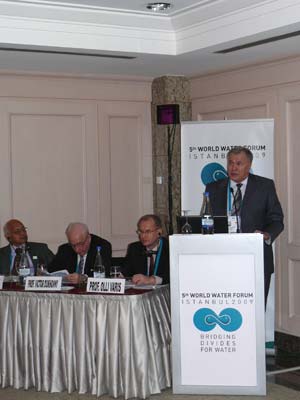
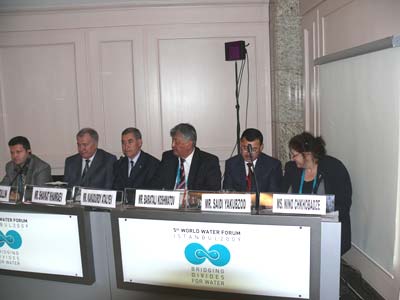
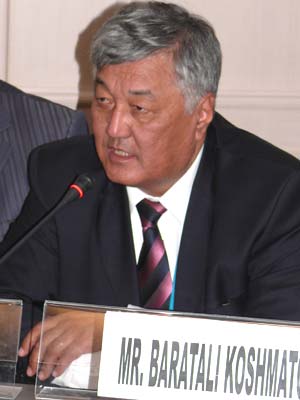
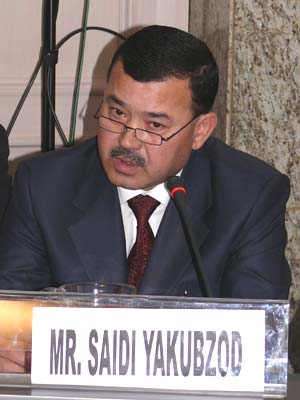
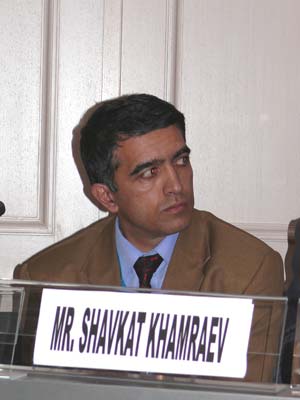
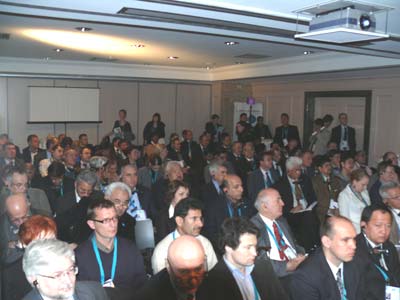
Prof. V.A. Dukhovny was a reporter and panelist on 3 issues: "Climate Change and its Impact on Social Indexes", "Water and Food" and "Asian Cooperation in Knowledge and Science"; he as a judge took part on the awarding ceremony of the Kyoto Prize. Dr. V.I. Sokolov participated as a reporter and moderator at the sessions 3.1.2 and 3.1.4. He presented the system of water governance by the IWRM-Fergana project case study, which consisted of water management administrations and public administrative bodies at all hierarchical levels. Moreover, principles of various sectors coordination - water users of all hierarchical levels - were presented in the paper; among other basin management tools, it was proposed to use UN bodies as a mediator in the negotiations, expertise and arbitration when parties cannot reach consensus about wide range problems on assessment, management and development of water resources.
At the special session "Aral and Caspi" initiated by the Russian Academy of Sciences V. Sokolov had informed participants about results of the Conference "Aral Problems, their impact on gene pool of people, fauna and flora and the international cooperation measures for mitigation of consequences" which was held in Tashkent, 2008.
Dr. Sh. Mukhamedjanov participated at the session "Water and Food" and presented results on the increase of land and water productivity; Dr. G. Stulina was a panelist at the side event 1.2 "Disbalance between land, water and population" of the World Gender Alliance session "Gender factors account at the water resources management". A. Sorokin had presented situation with competition "Water - Energy" in the Syrdarya River within the framework of the issue 3
Interview with the head of Uzbek delegation was published in the newspaper "Djumkhuriyat". This article and texts of speeches of H.E. E. Rakhmon, President of the Republic of Tajikistan, and also the statement of the President of the UN General Assembly are placed on the website: www.cawater-info.net/5wwf/
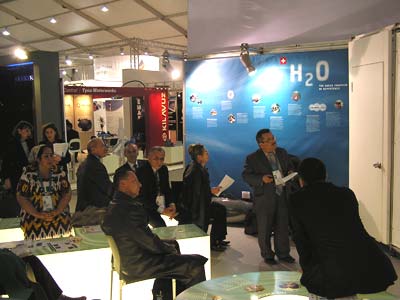
I. Opinion of Prof. V. Dukhovny is that water, especially in water scarce countries and regions, is always in the political agenda of governments, local authorities and everybody who are responsible for sustainable water supply for nature and society. In my view, the main purposes of WWF were:
- to rise water problems before global leaders – G8, G20, UN organizations and powerful public community and NGOs;
- to give a way to measures that will permit to overcome obstacles that take place in different corners of the globe and pose danger to ability of the poorest population to use water same as their ability to alleviate poverty.
The first purpose was achieved partly: UN organization participated friendly in the Forum with presentation of their idea and demonstration of their work. If they had penetrated in challenges of present water society – it would have been OK, but until now it is not clear. Moreover, one official negative reaction of the UN is the statement of the UN General Assembly’s President that criticized Forum. G8 and G20 were represented enough, but their reactions also are not clear, taking into account that nobody from real DMakers from these states participated in Forum. The High level meeting that we had ability to look in video hall involved only leaders of developing or transition states – not from those who manage the globe.
The second purpose was touched very weakly. A principle problem of the world water community is to prepare measures for guarantee of real human rights on water supply, sanitation and food production and protect these rights remained as a good wish that every government can take in account or ignore if they want.
II. The Ministerial Declaration was oriented at the Ministerial activities and such situation appeared: Ministers (or their representatives) gave recommendations to themselves. Why they don’t follow to their opinions if they agree with all their statements?
But many principle positions remained outside of these recommendations.
1. Theme 1. Climate change – lack of data and wrong hydrological forecast; absence of wish to exchange information, especially on transboundary rivers; limited number of States who signed the Aarhus Convention. The need to underline the role of multiyear regulation of flow that many states ignore for satisfaction of commercial interests of hydropower producers.
2. Theme 2
- Instability of water delivery for irrigation creates a big risk for achievement of MDGs not only for food, but also poverty alleviation because more than 50 % of population in rural area is connected with irrigation;
- Hydropower became a principal competitor of food production and taking into account growth of prices on energy incomparable with prices of food, irrigation production is failing. Even irrigation lands decreased by 11 Mha!!! But all this is out of attention of Declaration.
3. Theme 3
- Growing of hydroegoism of upper watershed found more and more support on the base of doctrine of “Absolute sovereignty”. As a result, water reservoirs on transboundary waters sometimes transform into a tool of political pressure.
- Until now, UN Convention 1997 has not been ratified!!! – nothing in Declaration.
4. Theme 4
- The water right is one of principle tools for guarantee of water availability and water input to MDGs. But what we see in Declaration? Only right for water supply and sanitation! Where is right on water for food, for environment? How this document will assist to equal rights of all people for survival, especially in arid zone?
- The very strong opinion on Forum was sound - enforcement of international water law should prevent ability to appearance of human-induced floods or droughts that need to be recognized as a crime against humanity.
III. Recommendations of Prof. V. Dukhovny for next Forum:
- Work on the Recommendation of future Forum should be started immediately after decision on creation of Organizing Committee of the Forum;
- The recommendation of Forum should be short, concrete and strictly oriented on proper address. The present as set of 150 items – Declaration. Varying as to the degrees of their relevance, acuteness, urgency that will hardly retain the attention of decision makers at the level of neither Heads of governments and sectors of economy nor senior officials of international global organizations.
- It would be more expedient to distribute specific actions ensuring water resources management adaptation by decision making levels which:
- Require the attention of global UN and other international organizations;
- Seek to make decisions at national governmental and parliamentary levels;
- Call for decisions at the agencies/sectors levels (water, agriculture or energy) that could be implemented by corresponding ministries;
- Are addressed to local authorities as well as to direct water users.
Then each of the audiences might find well-defined recommendations specifically designed for their attention – recommendations significantly less in numbers and more focused on vital issues enabling particular decision makers to grasp the essence of problems and identify the points at issue.
|